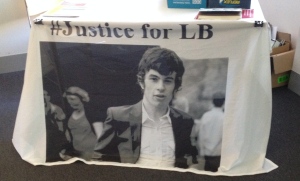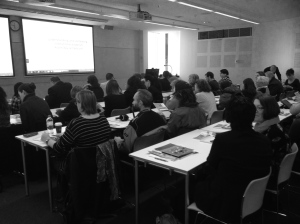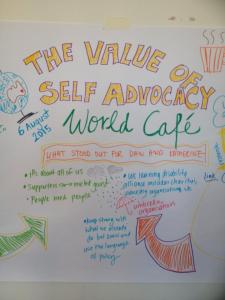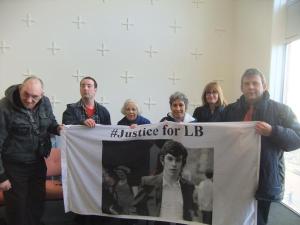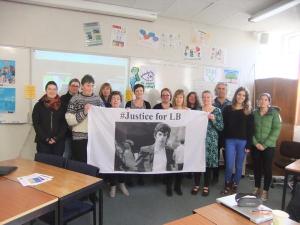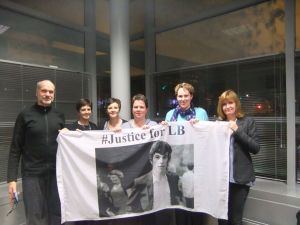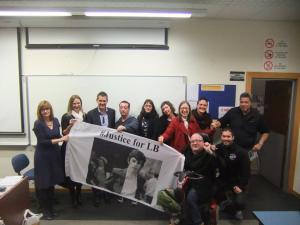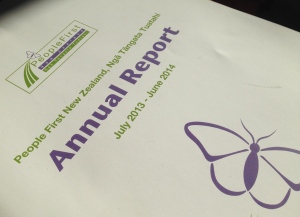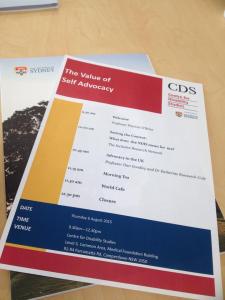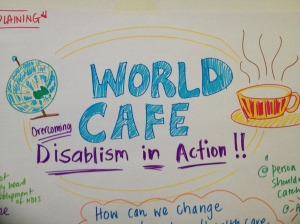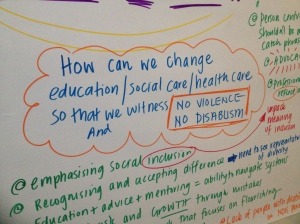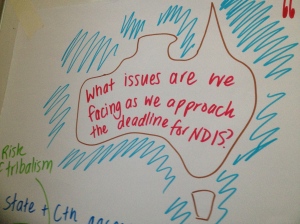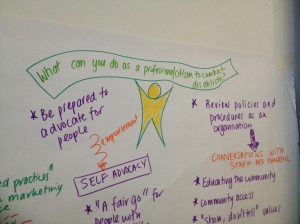Members of the research team, Dan Goodley (Sheffield) Katherine Runswick-Cole (MMU) and Toby Brandon (Northumbria), have been travelling, sharing findings from the project and learning about the lives of people with learning disabilities in the places we’ve travelled to.
As well as sharing our research findings, we’ve also been sharing #JusticeforLB. As many readers of this blog will already know, Connor Sparrowhawk, known affectionately by his family as Laughing Boy (LB), was a fit and healthy young man who had a learning disability and epilepsy and was left unsupervised in a bath in a National Health Service Assessment and Treatment Unit; he had a seizure and drowned. An independent inquiry found that Connor died a ‘preventable death’.
Connor drowned on 4th July, 2013, just a few weeks after this research project started. The over arching question for our project was how are people with learning disabilities faring in a time of austerity, or economic cuts? And there, just a few weeks in, was a deeply shocking answer. A campaign for justice for LB has evolved over the last two years. You can see the campaign aims in detail here: http://justiceforlb.org/what-is-justiceforlb/ and members of the research team have been playing their part in campaigning for justice for LB and for all people labelled with learning disabilities during the project.
Just over a year ago, Rebecca Lawthom (MMU) had the inspired idea of making a justice flag for LB and of taking it to the music festival at Glastonbury in 2014, it made a return journey in 2015. You can read about the LB flag at Glastonbury here: https://107daysofaction.wordpress.com/2015/06/30/week-14-back-to-worthy-farm-to-reclaim-our-humanity-justiceforlb-and-the-productive-potential-of-debility-politics-107days/
So, as we set out to visit Australia and New Zealand this year, we wanted to take the flag with us and to share LB’s story and to get international support for the campaign.
In this blog, we want to share some of the reactions we had when we talked about LB under the banner of the flag.
On 31st July, 2015 we delivered a lecture Becoming Dishuman: re-thinking civil society through disability. The lecture was 3rd Annual Trevor Parmenter Lecture The Centre for Disability Studies, The University of Sydney, New South Wales. An audience of disabled people, family members, academics and practitioners attended the lecture. When we spoke about LB’s story, we were greeted with a collective sharp intake of breath and the look of horror on people’s faces – a reaction repeated again and again on our trip. People wanted to know more about LB and to understand how it could have happened – we struggled to answer.
On 3rd August 2015, Dan, Toby and Katherine attended a symposium Understanding and contesting institutional disablism at The University of Sydney, New South Wales. Again the audience reacted with shock and members of the audience tweeted throughout the day using the #justiceforLB. One person contacted us afterwards to say that she had never had a tweet re-tweeted so many times, she was blown away by the power and compassion of the social media campaign.
On 5th August, 2015 at the Disability, Austerity, Resistance Seminar at the University of New South Wales, Australia, several members of the audience already knew about JusticeforLB. They too were shocked, horrified and angry but inspired by the international collective action that was driving the campaign, and keen to join and to harness such activism in Australia.
On 6th August, 2015, we told the LB story again at The Value of Self Advocacy Seminar, Centre for Disability Studies, The University of Sydney. As we took a breath at the end of telling the story, one of the self-advocates in the audience called out “That’s disgusting!”. Disgusting indeed. She talked to us afterwards; she knew what it meant to be institutionalized and how important it is to end institutionalization in all its forms.
As Katherine travelled on alone to New Zealand, her first meeting, on 10th August, 2015, was with People First, Dunedin. Their reaction was of anger, shock and an overwhelming desire to show their solidarity with the Justice for LB campaign. One of the self-advocates told Katherine that she knew about epilepsy as she lived with it herself; she knew how important it was to take care.
On 11th August, 2015 at the Becoming a researcher-in-residence (or the problem with coproduction) seminar at the department of Education, the University of Otago, Katherine spoke again about Justice for LB. Again people had heard the story, they knew about the campaign, even in deepest, darkest (coldest) Dunedin, on the other side of the world. People stood with the flag and they stood with Justice for LB.
In the evening, Katherine met the Family Network, Dunedin, a group of parents of disabled children. They didn’t know the story but they understood it straight away, as Katherine was talking one of the members of the group googled #justiceforLB and exclaimed “it’s all over the internet! It’s massive!”. Yep, massive indeed!
Finally, Katherine met the Disability Rights Commissioner for New Zealand, Paul Gibson. Over lunch, Katherine told the story and asked would he be happy for her to put up the flag at the lectures they were delivering later that day? He agreed straight away. A disabled person and long-standing advocate for disabled people, Paul didn’t need persuading to support #JusticeforLB. That evening at the lecture a group of hands hold the flag – a picture of collective action and solidarity on the other side of the world.
Thinking back about our experiences of telling the story over the last couple of weeks, a few things strike us. First, we’ve never had to explain the story twice. People understand; they ‘get it’ straightaway. When there is confusion, it is because people are struggling to understand how it could have possibly happened. They know what happened was wrong, they understand that LB’s death was a preventatble death and it should never have occurred.
Second, there has been an overwhelming sense of solidarity and connection with the people that we’ve told. Geographical distance makes no difference to the shock, horror and outrage, as well as to the commitment to change, that people feel.
We’ve been overwhelmed by the support people have shown for the campaign for justice, miles away, for a precious young man.
#JusticeforLB
#Justiceforallthedudes
Katherine & Dan

